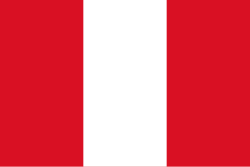| Peru at the Olympics | |
|---|---|
 | |
| IOC code | PER |
| NOC | Peruvian Olympic Committee |
| Website | www |
| Medals Ranked 98th |
|
| Summer appearances | |
| Winter appearances | |
Peru has officially participated in 20 Summer Olympic Games and 3 Winter Olympic Games. They did not send any athletes to the 1952 Summer Olympics. The Peruvian Olympic Committee is the National Olympic Committee for Peru which was founded in 1924 and recognized by the International Olympic Committee in 1936.
Contents
- Medal tables
- Medals by Summer Games
- Medals by Winter Games
- Medals by Summer Sport
- Medals by gender
- List of medalists
- Summary by sport
- Fencing
- Football (association)
- See also
- References
- External links
Peru's first official appearance at the Olympic Games was at the 1936 Summer Olympics in Berlin. However, prior to the creation of the Peruvian Olympic Committee in 1924, the Peruvian Carlos de Candamo competed in the 1900 Summer Olympics in two fencing events of foil and épée. Peru's first participation in the Winter Olympic Games occurred during the 2010 Winter Olympics.
Peru has won a total of five medals, three in shooting, one in volleyball and one in sailing. Their only gold medal was won by Edwin Vásquez in the 1948 Summer Olympics in the Men's 50 metre pistol. The first silver medal was won by Francisco Boza in Trap at the 1984 Summer Olympics. The Peru women's national volleyball team won Peru's second silver medal in the 1988 Summer Olympics, and Juan Giha won their third silver and latest medal in skeet at the 1992 Summer Olympics. The first bronze medal was won by Stefano Peschiera at the 2024 Summer Olympics in sailing.